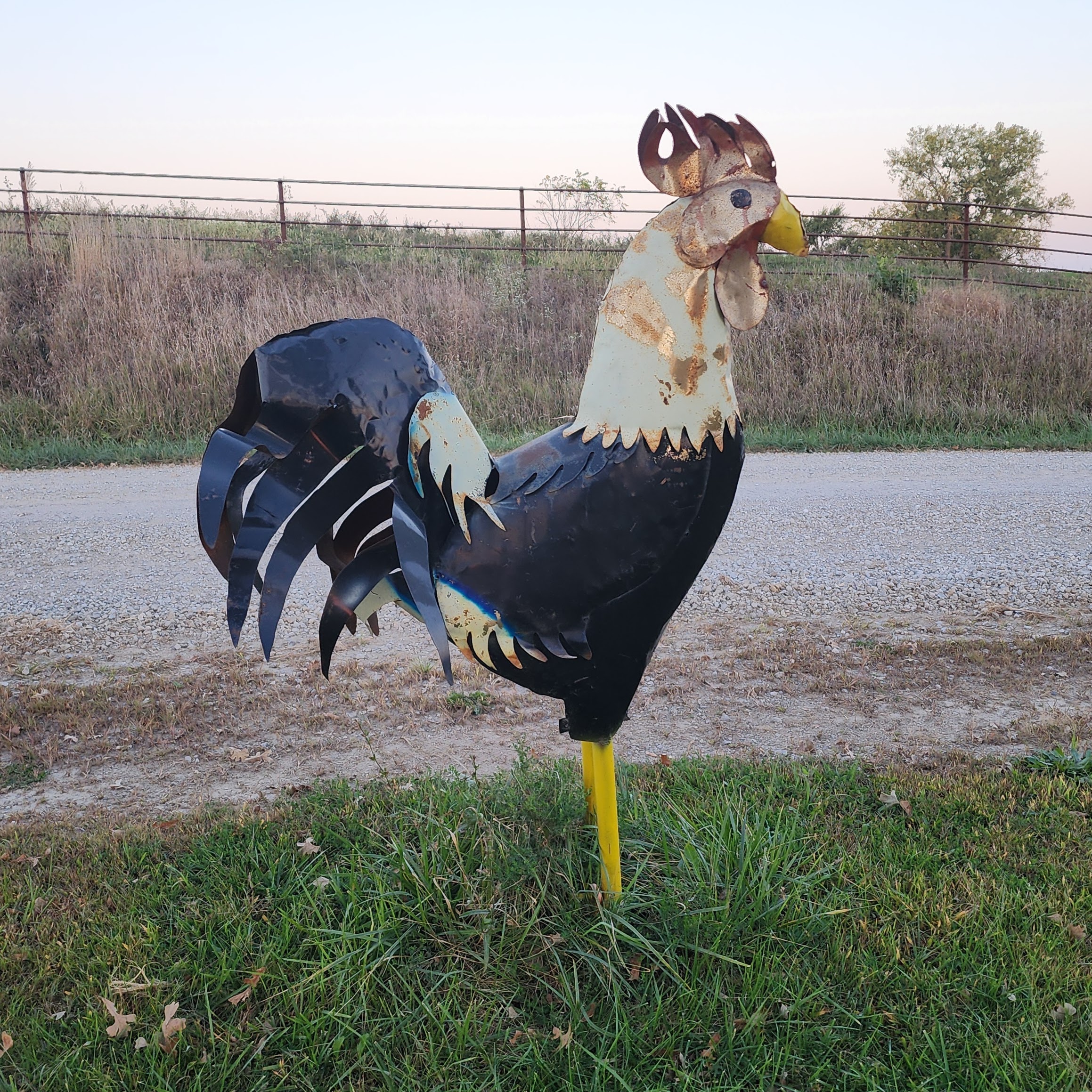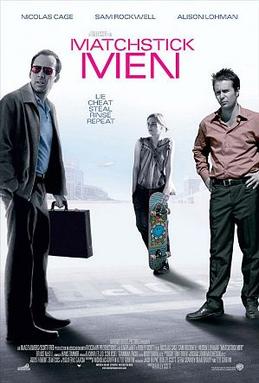What’s this all about?
In 2003, Ridley Scott, the director of Alien, brought us Matchstick Men, the story of what would happen if TV detective Adrian Monk was a con man.
It’s the story of a career con with a serious case of OCD, and probably several other psychiatric disorders, who runs a variety of cons on some unsuspecting marks while coming to terms with the fact that he has a 14-year-old daughter that he never knew about.
Along the way, he both teaches and learns some things about life. Then the ending happens, which ruins the otherwise enjoyable film.
It’s going to be hard to talk about this one without spoiling the “twist,” so consider this to be your spoiler warning (for this 22-year-old movie).
Who is Nick in this one?
Nick plays “Roy Waller,” a con man with an unspecified but crippling OCD-like condition. Casting Cage as a character with several “ticks” was a bold, and dangerous move, but for the most part, he pulls it off well.
Early in the film Nick expresses his dislike of “long cons,” and we’re made to believe that he has a vast store of wealth accrued from his many years of quick grifts. Watching a professional con pull pretty normal cons while having to cope with his mental issues is mildly interesting, and Cage is fairly believable in one of his more subdued roles.
Who else is in this one?
Sam Rockwell (Married to Veronica Mars, I think?) plays Frank, Nick’s con man protege. He’s far smoother and less neurotic than Nick, and it’s a little mysterious as to why he needs Nick at all.
Bruce McGill (The sheriff from My Cousin Vinny) plays “Chuck,” a high-dollar mark in a long-ish con scheme.
Allison Lohman (Drag Me To Hell) plays “Angela,” Nick’s irritating but somewhat typical 14-year-old daughter, whom he has never met. More on that in a minute.
Did you see that?
Allison Lohman’s performance as Nick’s 14-year-old daughter is remarkable. She expertly portrays not only the frenetic energy of a young teen, but also that constant slight dirtiness of kids who are approaching, but not quite arriving at adulthood. She talked with her mouth full of food, looked like she’d be just a little sticky, probably wouldn’t smell great, and left a mess wherever she went. It was very convincing without going over the top.
This was critical to the role, as it serves as a contrast to Nick’s own fastidiousness.
The role was played so well, in my opinion, that about 45 minutes into the movie, I started wondering if they’d gotten a real 14-year-old for this fairly complex role.
I was shocked to learn that Allison Lohman was 24-years-old when she made this film.
The twist, of course, is that the character was actually an adult pulling a con the whole time. If anything, Lohman played the role too well, leaving no clues in her performance that the “kid” she was portraying was a fake. Or maybe that was the point? I don’t know.
I saw the ending coming a mile away, but I did not suspect that Nick’s daughter would turn out to be an adult actor. -Michael
There was a scene in the movie where Nick was sitting in his car, spying on some children in a playground. During this scene he was smoking a cigarette and some continuity issues slipped by in editing. There were some cuts where Nick’s cigarette dramatically changed length and then went back. Yep, busted. – Sarah
What were Nick’s best parts?
After Nick meets and first spends time with his previously unknown daughter, he drives her home, and the two part ways. As they do so, Nick’s daughter leans in to give him a kiss on the cheek. Nick reacts with the awkward confusion of a person caught totally unexpecting, and he wildly fumbles the response. It was perfectly accurate, and almost made me wonder if the director hadn’t told Nick that the kiss was going to happen, a la Alan Rickman’s rooftop drop in Die Hard.
It was a small moment delivered in a way that spoke volumes about the characters unease with “normal” social conventions, and his desire for real contact with his newfound child. -Michael
Shame on you Michael. I called the awkward kiss! You took the moment the therapist told Nick he had a daughter. It freaked him out so much it caused his eyes to go into a massive nervous tick. It was not only hilarious bit incredibly well done. You could so easily feel his shock and fear from that news. -Sarah
Editor’s Note: She’s right. I wrote about the wrong scene. We take notes when we watch these so that this doesn’t happen. I just didn’t read mine. Sorry! -Michael
What were Nick’s worst parts?
After losing his critical mood stabilizing drugs, a frantic Nick runs into a drug store seeking more. He charges to the pharmacist’s counter, where another customer who has been waiting asks, “hey pal, have you ever heard of a line?”
Nick responds by asking, “have you ever been dragged out in the street and beaten until you piss blood?” resolving the matter.
Microsoft Teams
Not only is this level of violence out of character, Nick decides that he needs to deliver the line with an even, if frantic tone, except for two words, which he shouts. Can you guess which two words?
If you guessed “piss” and “blood,” then you’ve either seen Nick Cage before, or you need mood stabilizing drugs.
Up until that scene Nick had resisted his urge to play the character as a sufferer of Tourette’s Syndrome, but in this one, he went full-on “Screamin’ Nick.” It was out of place and jarring. -Michael
At the beginning of the movie we get to witness Nick and his partner pull off a con. While this scene clearly establishes Nick and his partner as con men, there is a moment where Nick out of nowhere yells and for no reason. For the most part, there wasn’t too much “Screamin’ Nick” in this movie, but he did bring it out and it just wasn’t necessary. -Sarah
How was the movie?
I’m really conflicted about this one. I enjoyed this movie, mostly. Everyone, including Nick, did a great job with their roles, and the story was interesting. We saw real conflict and real character growth. The cons were realistic and interesting, providing a more-or-less accurate look at the kind of schemes that seem to become more relevant by the day. It was funny where it wanted to be funny.
That said, it seems that there is an unwritten Hollywood rule that you can’t make a movie about con men without a twist ending. Knowing that, I saw the twist in this one coming a mile away, and whenever that happens, it impacts the viewing experience, as the viewer starts paying more attention to clues about the twist than the on-screen drama.
Ultimately, the twist, that Nick’s long-lost daughter was in fact, working with his trusted partner to scam him out of his fortune, was disappointing on two levels.
First, the scheme required a huge number of “happy accidents” and leaps of logic to work. How did the scammers know that Nick would add his “daughter” to the signature list on his safe deposit box? That was done in a spur-of-the moment encounter. Was Nick’s dependence on what turned out to be fake mood stabilizers purely placebo effect? How did Sam Rockwell know that would work? This list goes on. Other films in this genre sometimes employ a flashback montage explaining these details, but not here.
Ultimately, though, the biggest disappointment to me was that Ridley Scott committed one of my storytelling pet peeves. Nick “escapes” from the “hospital,” figures out that he’s been scammed, and we see him realizing the depth of his problem. He checks his safe deposit box and finds it empty. He does the same with his stash at home. As reality sinks in, he goes to his ex-wife’s house, and realizes that not only was “Angela” not really his daughter, but that his ex-wife never gave birth to his child at all. Nick collapses in tears on her front porch.
That’s where the movie ends.
The story is over.
Nick is left in the very same position that he’s made a career leaving other, more innocent people in. All of his commentary about only being able to scam people who are greedy and let it happen are true about him as well, except his greed wasn’t for money. It was for a meaningful human connection in life.
Sadly, instead of rolling credits and going home, Ridley Scott just kept on shooting.
We get a scene in which we see Nick, a year later, working as a carpet salesman. He encounters “Angela” as a customer, and learns that she too got scammed by Sam Rockwell. The two sort of reconcile, and share a moment that I think was meant to be touching.
Then Nick goes home to his pretty new wife (a cashier from the grocery store that we saw in several otherwise pointless scenes) and embraces her growing, pregnant belly.
This tacked on everything-is-all-right happily-ever-after bullshit honestly ruins the movie. The tone shift is abrasive, and the “payoff” seems completely unearned. -Michael
I can’t agree more with Michael on this one. I was enjoying the movie and then all of a sudden, boom, bad ending. I really hated the ending too. I’m afraid it was bad enough to spoil the whole thing. And not bad enough to make it a great bad movie. I just flopped. -Sarah
Yeah, but did you like it?
I enjoyed it while I was watching it, but the ending pissed me off. I won’t watch it again. -Michael
I’m going to have to say. “no.” -Sarah
Where can I watch it?
It’s free on Tubi, which appears to be where lesser-known Nick Cage movies go to die.


Leave a Reply